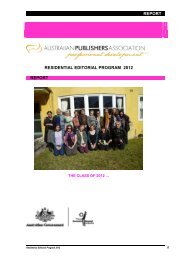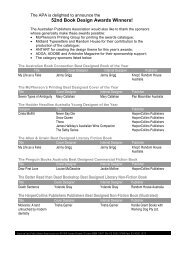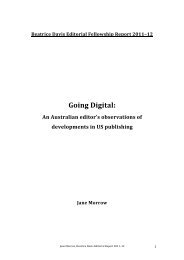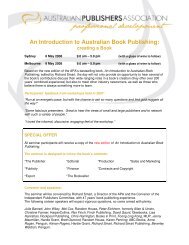Report 2013 - Kelly Fagan HERE - Australian Publishers Association
Report 2013 - Kelly Fagan HERE - Australian Publishers Association
Report 2013 - Kelly Fagan HERE - Australian Publishers Association
Create successful ePaper yourself
Turn your PDF publications into a flip-book with our unique Google optimized e-Paper software.
What Does it Mean to Connect Directly with Consumers (cont.)<br />
So far, trade publishing houses in the UK have largely responded to this by streamlining their sales, marketing and<br />
distribution of books. There continues to be experimentation around price and format, and a focus on metadata,<br />
search engine optimisation and web presence (all of which could be the subjects of entire reports on their own).<br />
Focus on Branding<br />
Some publishers have a renewed focus on branding – publisher branding. Stephen Page believes the identity of<br />
Faber and Faber as a brand is key to the continued success of the business. Faber has a rich history in which to<br />
base its brand. When visiting the London office Page talks about ‘the house that TS Eliot built’ and tells me about<br />
the archive of letters from Eliot to his writers, ‘writers of huge importance’, that are still kept within the building.<br />
‘We’re getting better and better at living the myth’, Page says. 58 Further to this, the publishing house has just<br />
announced a redesigned word marque as part of a branding strategy designed to ‘future-proof’ the publisher for<br />
the digital era. 59 In announcing the branding strategy to the trade press in London, Page said: ‘Faber’s trademark ‘ff’<br />
colophon, created by Pentagram, has sat at the heart of our brand for nearly 30 years, and will continue to do so.<br />
In announcing a thrilling list for spring 2014, we are also unveiling a new design for our word marque. Reviewing our<br />
brand design in the light of the new world of reading, with its emphasis on readers online and digital publishing, we<br />
realised that we needed to find new ways to express our visual identity.’ 60<br />
Brand and branding is ‘massively important’ at Bloomsbury too. Group Sales and Marketing Director Kathleen<br />
Farrar talked about the company’s global strategy and the importance of consistent branding of authors, of titles,<br />
and of the company across the world as integral for the company in the current publishing climate.<br />
Penguin, Faber and Bloomsbury all benefit from having a brand which is recognisable to consumers. As publishing<br />
houses continue to grapple with the challenges presented by the digital landscape, having a brand that is already<br />
known and loved by readers as well as writers is surely a huge advantage. Is it then necessary for other publishing<br />
houses to try to gain similar awareness with readers at a company level Is this even possible Looking at the film<br />
industry there are many studio brands that the general public recognise, but I highly doubt that the average filmgoer<br />
is searching the internet wondering what the latest Paramount release is.<br />
At a staff Q&A session with former HarperCollins CEO Victoria Barnsley the question of branding arose once again.<br />
Barnsley talked about the importance of publishers having a consumer-facing brand but thought that for a big house<br />
with a diverse publishing program like HarperCollins this could be more easily achieved through the branding of<br />
particular imprints: Harper’s literary imprint Fourth Estate, and Voyager, Harper’s fantasy imprint for example, offer a<br />
much easier ‘consumer brand’ than the giant umbrella that is HarperCollins. Furthermore, Barnsley said is that it is<br />
more important that ‘books and authors are the consumer face’ of any publishing brand. 61<br />
While it is true that there are advantages to both approaches, it would be expensive for a larger publishing house or<br />
imprint without existing brand recognition to embark on self-branding exercises alongside those they are undertaking<br />
for their authors and books. Hachette, for example, has so many different publishing companies working throughout<br />
various territories that it seems pointless for them to try to turn ‘Hachette’ into a brand that readers will look to.<br />
Random House, HarperCollins and Simon & Schuster all have names that many readers will recognise – and trust<br />
to a degree – but rarely would a reader believe that their offerings are so consistent that they would trust the brand<br />
in the same way they would an author and thus would automatically buy, e.g. the next book by Lee Child. Whilst the<br />
intersection between readers and these publishing brands is much more likely to happen at an author or book level,<br />
there is certainly an argument for these publishers building communities around marquee brand authors in order to<br />
promote new talent on their lists.<br />
58 Face-to-face interview with Stephen Page, CEO Faber and Faber, 12 June, <strong>2013</strong><br />
59 http://www.thebookseller.com/news/new-branding-faber.html<br />
60 http://www.thebookseller.com/news/new-branding-faber.html<br />
61 Company Q&A session with Victoria Barnsley, 6 June <strong>2013</strong><br />
Author: <strong>Kelly</strong> <strong>Fagan</strong><br />
22









